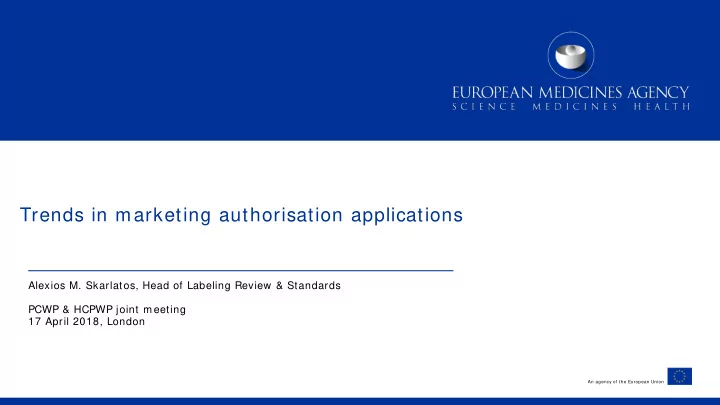

Trends in marketing authorisation applications Alexios M. Skarlatos, Head of Labeling Review & Standards PCWP & HCPWP joint meeting 17 April 2018, London An agency of the European Union
General remarks • Limited experience/ use so far in the centralised procedure of digital solutions • Quick Response (QR) code is the platform most commonly used in centrally approved products • EMA has developed and published guidance on QR codes • Other innovative ‘e-solutions’ (e.g. apps, e-packaging, monitoring tools) seen at development stage 1
QR codes in the centralised procedure – Legal basis • Directive 83/ 2001, Art. 62 : The outer packaging and the package leaflet may include symbols or pictograms designed to clarify certain information mentioned in Articles 54 and 59(1) and other information compatible with the summary of the product characteristics which is useful to the patient, to the exclusion of any element of a promotional nature . 2
QR codes in the centralised procedure – Main principles A QR code may link to a website, web page (e.g. standalone PDF document) and/ or smartphone applications specifically created for that purpose. Ensure access to most patients (all Member States). Enable access to the information either by scanning or by typing the URL in an internet browser. QR codes must not replace statutory information (e.g. printed package leaflet). QR codes to provide statutory information or other information that is compliant with article 62. 3
QR codes in the centralised procedure – trends Mostly linking to statutory information, i.e. SmPC or package leaflet. Additional information (videos) included for products with complex method of administration provided with a medical device (e.g. inhalers, insulins). Also used as search tools, e.g. long lists of amenable mutations to be searched. 4
Other innovative solutions – only at development stage Apps, chips or similar devices to collect, store and further transfer patient usage information. Proposed aim can vary from enhancing patient adherence to treatment down to data collection by health care professionals Issues of personal data collection 5
Conclusions EMA and Member States open to discuss and consult with applicants on any innovative proposal. Promotional elements and legal aspects of data protection to be carefully considered. 6
Thank you for your attention Further information European Medicines Agency 30 Churchill Place • Canary Wharf • London E14 5EU • United Kingdom Telephone + 44 (0)20 3660 6000 Facsim ile + 44 (0)20 3660 5555 Send a question via our w ebsite www.ema.europa.eu/ contact Follow us on @EMA_ New s
Recommend
More recommend